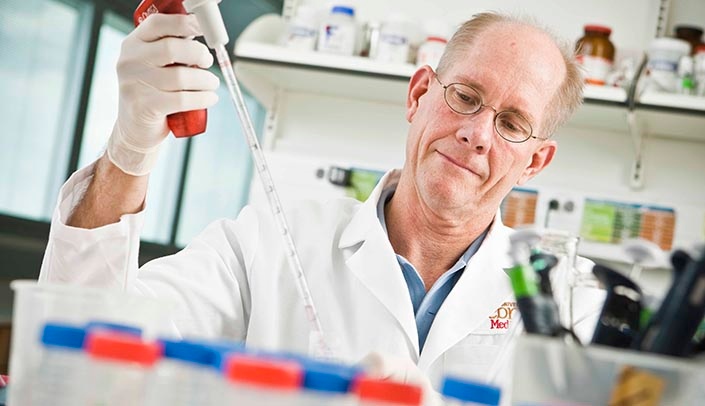UNMC and Hemispherx Biopharma, Inc. are joining forces to take on pancreatic cancer, one of the most deadly forms of cancer. In mouse model studies, Hemispherx’s immune-enhancing drug, Ampligen — an immune-enhancer TLR3 agonist — will be administered with a peptide vaccine developed by UNMC.
The study will test the capability of Ampligen to enhance immune responses when combined with a peptide vaccine developed by UNMC for MUC1-positive pancreatic cancer. MUC1, a tumor-associated antigen, is produced by many common, highly lethal cancers, including cancers of the colon, breast, ovary, lung and pancreas.
In the study, UNMC researchers will immunize mice with pancreatic tumors expressing MUC1. The mice will receive Ampligen in combination with the peptide vaccine, with subsequent immune checkpoint blockade.
“A prior pre-clinical vaccine study at UNMC using Ampligen in combination with the checkpoint blockade yielded promising results,” said David Strayer, M.D., chief scientific officer for Hemispherx. “The objective now is to expand this experimental vaccination approach using Ampligen and a more specific antigen in combination with the checkpoint blockade. We believe these studies may yield important insights.”
UNMC is one of the leading institutions in the country in studying pancreatic cancer. In 2014, UNMC received a five-year renewal of its $11.5 million pancreatic cancer SPORE (Specialized Programs of Research Excellence) grant from the National Cancer Institute.
“We are working hard to discover better treatments for pancreatic cancer,” said Tony Hollingsworth, Ph.D., the Leon Professor of Cancer and director of pancreatic cancer research for UNMC. “We believe Ampligen is an agent that holds tremendous promise – not only for pancreatic cancer, but also for a variety of other cancers.”
“We are delighted UNMC is continuing with these studies as part of our step-by-step progression to develop effective treatments that will prolong or possibly save the lives of people with pancreatic cancer, a devastating disease with a five to six percent five-year survival rate,” said Thomas K. Equels, chief executive officer of Hemispherx. “Finding a cure for this highly lethal malignancy is one of our top priorities.”

Any studies on people? I know someone just diagnosed with Stage IV.